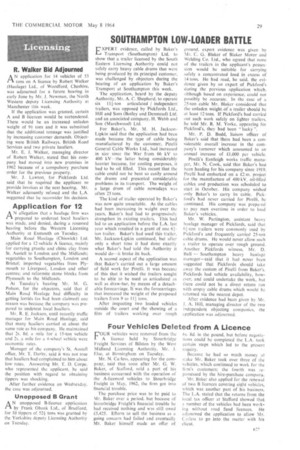SOUTHAMPTON LOW-LOADER BATTLE
Page 31

If you've noticed an error in this article please click here to report it so we can fix it.
EXPERT evidence, called by Baker's Transport (Southampton) Ltd. to show that a trailer licensed by the South
Eastern Licensing Authority could not safety carry heavy cable drums that were being produced by its principal customer. was challenged by objectors during the hearing of an application by Baker's Transport at Southampton this week.
The application, heard by the deputy Authority, Mr. A. C. Shepherd, to operate
six 111-ton articulated / independent trailers, was opposed by Pickfords Ltd., Hill and Sons (Botley and Denmead) Ltd. and an associated company, H. Webb and Son (Marchwood) Ltd.
For Baker's, Mr. M. H. JacksonLipkin said that the application had been made because the type of cable being manufactured by the customer, Pirelli General Cable Works Ltd., had increased in size since the War from 66 kV to 400 kV—the latter being considerably heavier because, for cooling purposes, it had to he oil filled. This meant that the cable could not be bent so easily around the drums and presented considerable problems in its transport. The weight of a large drum of cable nowadays was often 25 tons.
The kind of trailer operated by Baker's was now quite unsuitable. As the cables had been increasing in weight over thc years, Baker's had had to progressively strengthen its existing trailers. This had led to an application before the L.A. last year which resulted in a grant of one 6ton trailer. Baker's had used this trailer.
Mr. Jackson-Lipkin continued, but after only a short time it had done exactly what Baker's had told the Authority it would do—it broke its back.
A second aspect of the application was that Baker's carried out a large amount of field work for Pirelli. It was becaus, of this that it wished the trailers sought to be able to be used as articulated as well as draw-bar, by means of a detachable forecarriage. It was the forecarriages that increased the weight of the proposed trailers from 9 to 111 tons.
After inspecting two loaded vehicles outside the court and the showing of a film of trailers working over rough ground, expert evidence was given by Mr. C. G. Blaker of Blaker Motor and Welding Co. Ltd., who agreed that none of the trailers in the applicant's possession would he suitable for carrying safely a concentrated load in excess of 14 tons. He had read, he said, the evidence given by an expert of Pickford's during the previous application which, although based on experience, could not possibly be accurate: In the case of a 25-ton cable Mr. Blaker considered that the unladen weight-of -a trailer should be at least 12 tons. If Pickford's had carried out such work safely on lighter trailers, he told Mr. R. M. Yorke, appearing for Pickford's, they had been "lucky ".
Mr. P. D. Budd, liaison officer of Baker's said that there had been a considerable overallincrease in the company's turnover which amounted to an annual increase of 11,000 per vehicle.
Pirelli's Eastleigh works traffic manager, Mr. N. Cook, said that Baker's had been hauling for his company since 1919. Pirelli had embarked on a £2m. project for the manufacture of 400 kV. oil-filled cables and production was scheduled to start in October. His company wished only Baker's to carry its cable. Pickford's had never carried for Pirelli, he continued. His company was prepared to pay men overtime in order to load Baker's vehicles.
Mr. W. Partington, assistant heavy haulage manager of Pickfords, said that 6--;-ton trailers were commonly used by Pickford's and frequently carried 25-ton cable drums. He would never allow such a trailer to operate over rough ground. Another Pickfords witness, Mr: D. Bull — Southampton heavy haulage manager—said that it had never been suggested that Pickfords. should take away the custom of Pirelli from Baker's. Pickfords had vehicle availability, however, and could undertake the work, but there could not be a direct return run
ith empty cable drums which would be returned via the nearest depot.
After evidence had been given by Mr. J. A. Hill, managing director of the two independent objecting companies, the application was adjourned.












































































































